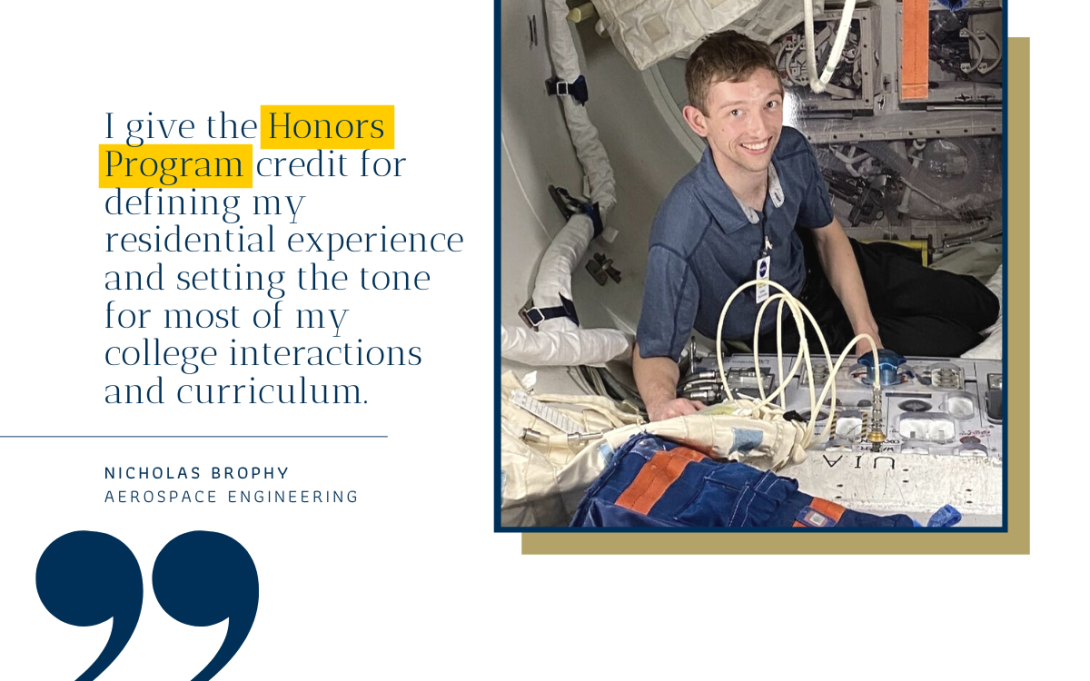Nicholas was part of Honors Program throughout his years at Georgia Tech both as an Honors member and as a student aid for the Honors help desk.

I give the Honors Program credit for defining my residential experience and setting the tone for most of my college interactions and curriculum. Graduating with an Honors Program designation on the surface means that you’ve completed an allotted number of classes with certain teachers with the same group of people for four years. But that designation does not define the experience.
A great example lies in a chain of engineering classes I took with Professor Jason Wang through Honors. These classes featured much of the Honors Programs’ values of multidisciplinary learning and lesson plans that force engaging with material and conceptual frameworks. An example of this can be easily found in the Honors Program statics course. The Honors Program focuses on preparing a toolbox of skills to use beyond the problem sets in the class. It’s a focus on learning context rather than simply the equations. Professor Jason Wang’s statics class was offered to my year and was met with extremely positive feedback. Myself and a few other students petitioned for Dr. Wang to continue teaching statics and the further deformable bodies course for engineers. This petition was granted and I and my peers continued our mechanics knowledge through the Honors Program. HP supports student learning on an individual basis. I was not really surprised by the responsiveness to our petition because HP staff are honestly the best, but I was nonetheless thrilled that our voices were heard and the class was made available in the next semester. Overall, Georgia Tech encourages peer to peer learning, in fact, without study groups I don’t think most students would graduate. But the Honors Program makes this a part of the learning experience.
My time outside of the Honors Program was primarily spent in research at ASDL and in the development of the Georgia Tech Experimental Rocketry program of which I was president for three years. The Honors Program supported me by being a consistent source of members who want to do more outside of the classroom. In the years I was president, GTXR went from 15 to over 150 members and our funding went from about $15,000 to over $250,000 from various sources. The Honors Program was generous enough to be one of these sources supporting students in the travel to the Mojave Desert test area and the launch of our latest sounding rocket this summer.
Outside of engineering, the Honors Program fueled my love of English and the arts in a way that I didn’t expect from an engineering school. The Honors retreat opened a door to my later volunteerism at the Shakespeare Tavern. I took classes that focused on topics in English, Management, and Music that I probably wouldn’t have taken if not offered as with the Honors stamp of approval. I even ended up joining the HP section of glee club just as an “old college try” and ended up loving it in my last two years at Tech.
In moving on to my career, I think it’s pretty easy to see where the Honors Program is going to make a difference. Today I work for Raytheon Technologies Collins Aerospace on the next generation space suit for Artemis. My role primarily focuses on systems design and testing. This requires a massively multidisciplinary skillset. I remember when I applied to the Honors Program one of the questions was about how I thought being multidisciplinary was important in an engineers’ career. I wrote about how important it was to have good writing skills as a basis for technical writing. Today, I work with project engineers writing massive requirements and analysis documentation with strict expectations for how an argument is framed and how an analysis is portrayed both its weaknesses and strengths. Engineers who think soft skills and English aren’t important are just wrong and the Honors Program made that clear even from the application.
Entering the Honors Program being multidisciplinary was emphasized in the sense that it was important to be able to understand the perspectives of various disciplines. Through my extracurricular activities and now in my professional work I have always needed the same skill set. The Honors Program gave me my first look at the importance of this cross disciplinary communication. Honors curriculum taught me the importance of leadership, the necessary functions for keeping yourself motivated and productive in a stressful environment, and how to work surrounded by ... talented like-minded people.
The Honors Program today remains a source of some of my greatest friends and some of my best memories at Tech. Even from the first week freshman Honors retreat I was surrounded by people who would become my friends for the rest of college. This comes from a program devoted to gathering like-minded dedicated students across many disciplines, sticking them all in the same common room area and letting us all struggle together in pursuit of that long-awaited diploma. Georgia Tech students do a fine job of creating these groups on their own, but HP does it better. For that, I will forever be thankful the Honors Program was there as a support for me and my peers in our journey at Georgia Tech.
